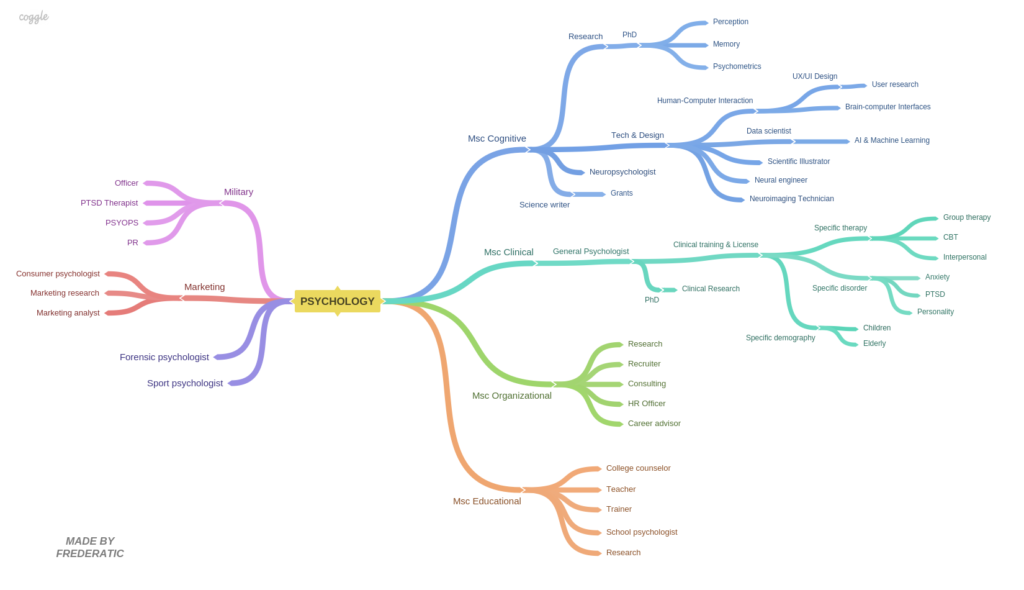What to do with a psychology degree?
If you tell people you are a psychologist, the first image that pops into their mind is of you, sitting on a couch, listening to people and asking them: “How does that make you feel?”. While you can certainly do this, this is just one of many careers you can get into. Psychology studies human behaviour and fortunately for you, human behaviour plays a role in any field and job. Aside from the popular Master degrees most universities offer, with some creativity you can go into another direction. So if you not sure what to do or are looking for inspiration, this overview is perfect for you.
Clinical
Clinical psychology focuses on diagnosing and treating mental disorders. After getting some clinical training and a license, you can specialize in a specific disorder, demography or therapy. For example, you could treat anxiety disorders in children or become a hypnotherapist. You could also get a PhD and focus on clinical research by studying various disorders and the effectiveness of therapies.
Organizational
Organizational or industrial psychology focuses on problems in the workplace. An organizational psychologist would study the performance of employees and come up with ways to improve it. You could do this as a consultant for various companies or you work in the Human Resources department as a recruiter or HR officer. Just like with clinical psychology, you can focus on doing research in this field by getting a PhD.
Cognitive
Cognitive psychology focuses on mental processes such as memory and perception. This field is very multidisciplinary and it is recommended you specialize as much as possible. Whether it is cognitive psychology, neuroscience, cognitive neuroscience or something else, these fields revolve all around the brains. By getting a PhD, you could become a researcher and study a concept or brain area from a specific perspective. These jobs are often in academia, but biotech companies are also major employers.
If you develop your data analysis skills more, you could become a data scientist and eventually apply your knowledge of the brain to developing artificial intelligence. If you are into design, you can use your knowledge of how people think to develop great user experiences and interfaces. If you know how to draw, you could create scientific illustrations of various parts of the human body. And if you like to write, you could become a science writer, writing articles and grants for other researchers.
Educational
Educational psychology focuses on human learning. An educational psychologist could not only teach and train people, but also counsel in a school or college. Additionally, you can research new learning methods by getting a PhD.
The above are common paths that are offered in the form of Master degrees by many universities. However, with some creativity you can also go into other directions.
Marketing
A psychology degree forms a nice foundation to get into the world of marketing and advertising. Common things to do are marketing research or analysis. You would gather and analyze information about a market, product or service. You could also become a consumer psychologist and study consumer behaviour. With some design skills, you could create persuasive advertising campaigns.
Sports
If you are passionate about sports or like to stay fit yourself, you could become a sports psychologist. You would help athletes by enhancing their performance through various mental strategies and relaxation techniques so they can achieve their full potential.
Forensic
If you want to get into criminal law, you could become a forensic psychologist. A forensic psychologist could treat anyone who has come into contact with the criminal justice system, whether it is a criminal, victim or bystander. You could study consult on various cases by studying criminals and their crimes to figure out traits or patterns. You might have seen an exaggerated example of this in a Crime TV show.
Military
If you have joined or are planning to join the military, you can combine this with a psychology degree to do some interesting stuff. You could diagnose and counsel at a military base or with some clinical training, treat PTSD patients. With intense training, you could get into the Special Forces and focus on Psychological Operations (PSYOPS). This psychological warfare makes use of various methods to influence the emotions and behaviour of large groups and sometimes entire countries.
As you can see, there are many paths to walk with a psychology degree. Some of them are already paved because of how established they are, while others are more difficult to see and require you to pave the path yourself. Hopefully this helped you pave your own pathway a little bit.


